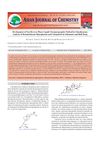 6 citations,
August 2020 in “Clinical case reports”
6 citations,
August 2020 in “Clinical case reports” Isotretinoin was not effective in treating facial lichen planopilaris.

Cepharanthine could be a strong antiviral against COVID-19.
 3 citations,
January 2021 in “Plastic and Aesthetic Research”
3 citations,
January 2021 in “Plastic and Aesthetic Research” Hair loss reduces hair thickness and coverage, but drug treatments mainly revive dormant hairs rather than reverse thinning; patients often undervalue their hair loss severity.
 3 citations,
February 2016 in “Scandinavian journal of urology”
3 citations,
February 2016 in “Scandinavian journal of urology” Finasteride use varies among Denmark, Finland, Norway, and Sweden, with higher usage in Finland and Sweden.
2 citations,
July 2022 in “Sexual Medicine” Certain medications, especially 5-α reductase inhibitors and neuropsychiatric drugs, are often linked to erectile dysfunction.
 2 citations,
December 2019 in “Neurobiology of Stress”
2 citations,
December 2019 in “Neurobiology of Stress” Changing allopregnanolone levels in baby rats affects their adult behavior and alcohol use.
1 citations,
April 2021 in “Journal of the American Academy of Dermatology” Inconsistent platelet counts in PRP are due to varying blood volumes, preparation methods, and analyzer types.
 February 2024 in “Urology”
February 2024 in “Urology” Certain medications, especially Paroxetine, Tamsulosin, and Finasteride, are linked to ejaculatory disorders.
Certain medications, especially 5-alpha reductase inhibitors, are commonly linked to erectile dysfunction.
 December 2021 in “Daehanhanuihakoeji”
December 2021 in “Daehanhanuihakoeji” The traditional herbal formulas Yongdamsagan-Tang and Paljung-san, along with the drug finasteride, can reduce inflammation and may work together without affecting each other's effectiveness against benign prostatic hyperplasia.
April 2019 in “The Journal of urology/The journal of urology” Prescriptions for 5-alpha reductase inhibitors dropped significantly after the FDA's safety warning, especially for men with benign prostatic hyperplasia.
December 2019 in “International journal of pharmaceutical quality assurance” A reliable UV method was created to measure finasteride accurately.
 77 citations,
July 2020 in “European Journal of Clinical Pharmacology”
77 citations,
July 2020 in “European Journal of Clinical Pharmacology” Blocking the virus's entry into cells by targeting certain pathways could lead to early COVID-19 treatments.
 61 citations,
April 2014 in “The Journal of Steroid Biochemistry and Molecular Biology”
61 citations,
April 2014 in “The Journal of Steroid Biochemistry and Molecular Biology” Finasteride affects brain and blood steroids, causing lasting sexual and emotional side effects.
 28 citations,
September 2019 in “International Journal of Nanomedicine”
28 citations,
September 2019 in “International Journal of Nanomedicine” Minoxidil nanoparticles can potentially be a more effective treatment for hair growth than current treatments.
 25 citations,
July 2015 in “Colloids and Surfaces B: Biointerfaces”
25 citations,
July 2015 in “Colloids and Surfaces B: Biointerfaces” Iontophoresis improves minoxidil delivery to hair follicles for hair loss treatment.
 23 citations,
February 2015 in “International Journal of Molecular Sciences”
23 citations,
February 2015 in “International Journal of Molecular Sciences” Colchicine can inhibit hair growth by affecting cell activity and protein expression in hair follicles.
 19 citations,
November 2016 in “Dermatology and therapy”
19 citations,
November 2016 in “Dermatology and therapy” Stopping the medication infliximab and starting new treatments helped a woman's hair grow back and improved her scalp condition.
 15 citations,
October 2017 in “Journal of Cosmetic and Laser Therapy”
15 citations,
October 2017 in “Journal of Cosmetic and Laser Therapy” FDA-cleared devices may help treat hair loss, but more research needed; consult dermatologist before use.
 7 citations,
December 2017 in “Journal of the European Academy of Dermatology and Venereology”
7 citations,
December 2017 in “Journal of the European Academy of Dermatology and Venereology” Dutasteride is linked to a higher chance of sexual dysfunction, especially in younger males and the elderly.
 5 citations,
January 2014 in “Asian Journal of Chemistry”
5 citations,
January 2014 in “Asian Journal of Chemistry” Researchers developed a quick and reliable method to test for betamethasone dipropionate and calcipotriol in ointments and drugs.
 1 citations,
April 2016 in “Journal of The American Academy of Dermatology”
1 citations,
April 2016 in “Journal of The American Academy of Dermatology” Blood pressure medications may increase the risk of skin cancer.
 September 2023 in “The Journal of Steroid Biochemistry and Molecular Biology”
September 2023 in “The Journal of Steroid Biochemistry and Molecular Biology” Stopping finasteride for male pattern hair loss changes neuroactive steroid levels in the brain and blood.

The document suggests that drugs for prostate issues might cause lasting sexual, mental, and physical health problems due to blood vessel damage in the penis.

Some drugs may increase the risk of obstructive sleep apnea, while others like certain biologics might decrease it.
January 2023 in “Ethnobotany Research and Applications” October 2021 in “European urology open science” Finasteride use is linked to a higher risk of obstructive sleep apnea.
Finasteride use is linked to a higher risk of obstructive sleep apnea.
 68 citations,
January 2022 in “International Journal of Molecular Sciences”
68 citations,
January 2022 in “International Journal of Molecular Sciences” PCOS management includes lifestyle changes and medications, with ongoing research into repurposed drugs for better treatment options.





















